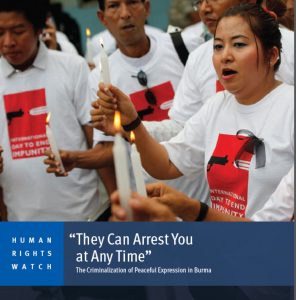Human Rights Watch: “They Can Arrest You at Any Time” The Criminalization of Peaceful Expression in Burma
By Human Rights Watch • June 29, 2016 The past five years have been a time of liberalization and change in Burma. The abolition of prior censorship and a loosening of licensing requirements has led to a vibrant press, and the shift from formal military rule has emboldened civil society.
The past five years have been a time of liberalization and change in Burma. The abolition of prior censorship and a loosening of licensing requirements has led to a vibrant press, and the shift from formal military rule has emboldened civil society.
The change has not been without conflict, however, and, under President Thein Sein, those who embraced the new freedoms to vocally criticize the government or military too often found themselves arrested and in prison. The backlash against critics was facilitated by a range of overly broad and vaguely worded laws that violate internationally protected rights to expression and peaceful assembly, some dating from the British colonial era, some enacted under successive military juntas, and others the products of reform efforts, or ostensible reform efforts, by the Thein Sein government.
This report examines how Burmese governments have used and abused these laws and the ways in which the laws themselves fall far short of international standards. It sets forth a series of concrete recommendations to the new Burmese government, led by Aung San Suu Kyi’s National League for Democracy (NLD), aimed at dismantling the inherited legal infrastructure of repression.
Download the full report in English here.
Download the tables in English here.
အစီရင္ခံစာ အက်ဥ္းခ်ဳပ္၊ အၾကံျပဳခ်က္မ်ား ႏွင့္ ဥပေဒဆုိင္ရာစံႏႈန္းမ်ား ျမန္မာဘာသာကုိ ဤေနရာတြင္ ရယူႏုိင္သည္။
Tags: ASEAN, Freedom of Assembly, Freedom of Information, Freedom of Movement, Human Rights Violations, Human Rights Watch, Military Regime, National League for DemocracyThis post is in: Crimes Against Humanity, Ethnic Nationalities, Health, Human Rights, International Relations, Law, Military Regime, Political Prisoners, Resistance, Women
Related PostsBurma Partnership Celebrates Continuing Regional Solidarity for Burma and Embraces the Work Ahead for Progressive Voice
Myanmar’s New Dawn :Opportunities for Aung San Suu Kyi and U.S.-Myanmar Relations
Expanding People’ Solidarity for a Just and Inclusive ASEAN Community
Civil society launches #FreeThe5KH campaign in support of the imprisoned ADHOC staff and NEC official
Myanmar logging ban a major step to forest sector reform









 All posts
All posts